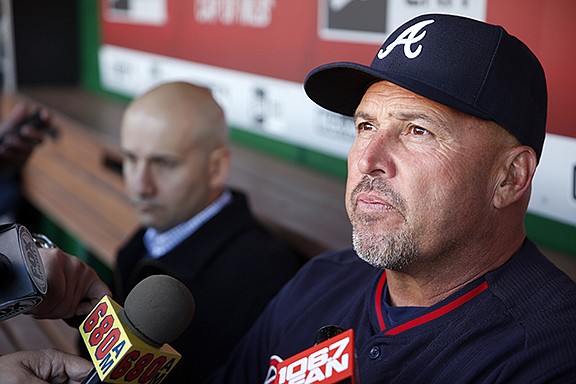Sometimes it's what a player doesn't say that says the most.
And so it might have been with a video that ran on the Atlanta Journal Constitution website early Tuesday evening of Atlanta Braves first baseman Freddie Freeman discussing the firing of manager Fredi Gonzalez earlier in the day.
Said Freeman: "When two guys lose their jobs (Gonzalez and bench coach Carlos Tosca), it's never a good day." He added, "I can't find one person to say a bad thing about (Gonzalez). He's a good guy. Everybody loves him around here."
He also said, "It's never good to go through a change like this during a season."
But he never said the move was wrong. Or unfair. Or that the problem wasn't Gonzalez, but rather the players.
Instead Freeman said this: "It's been a tough couple of years. We shouldn't be 9-28. We're a lot better team than what we've been doing every single night. Baseball's a business. Unfortunately, change was the way to go, I guess."
There probably should have been a change at the end of last season, when a club that had flirted with .500 until the All-Star break melted like ice cream in the August sun down the stretch. The Braves finished 67-95, and that was with a 6-4 record in the last 10 games.
As the franchise seeks to re-invent itself for the new ballpark it will move into next season, neither last year nor this year was all Gonzalez's fault. But unlike the Bobby Cox era, the Braves were almost always far worse in September under Friendly Fredi than in April. And that was long before this current decision by management to tear down in order to rebuild began.
Why the losses always came late never has been made clear. Maybe the players tired of the same soft-spoken managerial style that had worked so well for so long under Cox, whom many believe handpicked Gonzalez to succeed him. Maybe they merely took advantage of Friendly Fredi's good nature, which apparently almost never happened with Cox, who kept his fiery side private everywhere except around umpires but could definitely light a fire under a player when needed.
Or maybe the reality is, as general manager John Hart noted Tuesday: "Our bad start is not just laid at the foot of Fredi Gonzalez. We all assume a lot of responsibility. That being said, we do think we're better than what we've played."
But how much better?
As the Journal-Constitution's Dave O'Brien wrote on May 4: "Because whether you or I believe that Gonzalez is a good, bad or middling manager, the simple, inarguable fact is that he's been given a team entirely underequipped to compete at this level, to go toe-to-toe with most of those on an early schedule that ESPN's Buster Olney rated the most difficult in the National League, and which has proven to be precisely that."
Indeed, as bad the Braves have been, and they entered Tuesday night's game at Pittsburgh with the worst record in baseball, their schedule would have tested the best of teams.
Beyond that is the starting pitching, which has been all but unbelievable, especially of late, the rotation producing a 2.85 ERA over its last 14 games heading into the Pittsburgh series. Help would indeed appear to be on the way, once as it was at the dawn of the 1990s with Tom Glavine, John Smoltz and Steve Avery.
The plan to retool the organization, especially the farm system, in the image of the 1990s Braves seems to be working, though it will clearly take some time to pay dividends in the won-lost column. The franchise didn't burn to the ground overnight, and it's not going to rise from the ashes overnight.
To borrow a line from Ernest Hemingway's "The Sun Also Rises," a man is asked, "How did you go bankrupt?"
He answers, "Gradually, then suddenly."
That's what happened to the Braves. They have pretty much struggled since the last of their 14 straight division titles ended in 2005. They haven't won a playoff series since 2001. That's how gradual becomes sudden, how that 96-66 season in 2013 fell to 79-83 in 2014 to 67-95 a year ago to 9-28 this year at Tuesday's dawn.
That said, this year has been a disaster in all areas, including Gonzalez's use of the bullpen. And that disaster is how managers in their sixth year fail to get a chance at a seventh. It's why Gwinnett manager Brian Snitker now gets his shot in the majors, though he may actually be leaving more talent at the Braves' Triple-A level to work with less in the majors.
"Hopefully, having some guys at different positions, some better things will start happening around here," Freeman said.
Hopefully. But if not, expect it to be a long time before we see another Braves skipper get more than five years to win his first playoff series. That's the business of baseball. Especially when you're about to open a new ballpark that will need a reason to be filled beyond that newness.
Contact Mark Wiedmer at mwiedmer@timesfreepress.com.
